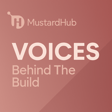
Brandon Amoroso on Solving Recruiting’s Biggest Breakdowns
In this episode of MustardHub Voices: Behind the Build, Curtis sits down with Brandon Amoroso—co-founder and CEO of SCALIS—to explore how broken hiring systems inspired him to build a fully integrated, AI-powered recruiting platform. After scaling and exiting a 50-person agency, Brandon saw the same pain points over and over: unqualified applicants, bad job recommendations, data loss across disconnected tools, and no feedback loops to improve match quality. Combined with his brother’s surreal job recommendations, those experiences pushed them to solve the problem at its root.
Brandon shares how SCALIS consolidates sourcing, ATS, and AI-based workflows into one engine, closing the loop between recruiter actions and algorithmic learning. He also breaks down the role of Bella, their agentic AI recruiter, and the real-world challenges companies face when adopting AI in hiring. Curtis and Brandon dive into the future of HR tech, the shrinking of entry-level roles, the return of in-person interviewing, and what great leaders do to create connection in remote teams.
About Brandon:
Brandon Amoroso is the founder of Shopify Plus agency Electriq and a 2023 Forbes 30under30 Miami awardee. He built the agency to oversee more than 55 brands and 45 team members in just three years before DRINKS.com acquired it in April 2022. Since the acquisition, he continues to run the agency while overseeing DRINKS' strategic partnership with Shopify and the DRINKS App, the world’s first real-time alcohol tax and compliance solution integrated natively into Shopify’s checkout.
Brandon is passionate about building businesses in industries that are rife with inefficiencies and legacy biases and processes. His new startup, SCALIS, was cofounded last year with his brother Parker, a recent graduate of Stanford, after Brandon’s frustrations with the hiring process and difficulty finding qualified and diverse talent, and Parker’s experience applying for internships. SCALIS is the world’s first fully-integrated job board and ATS platform, leveraging AI and machine learning to democratize hiring by matching relevant candidates with relevant employers.
